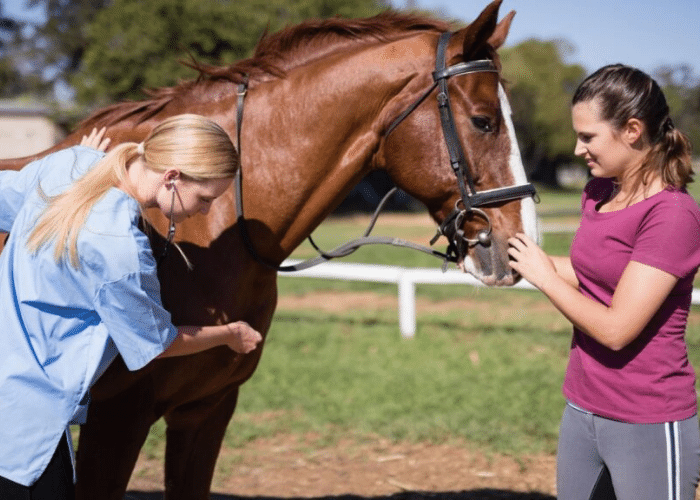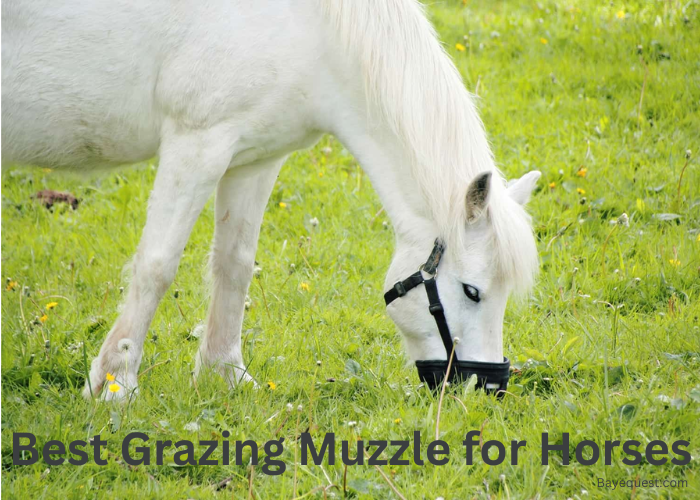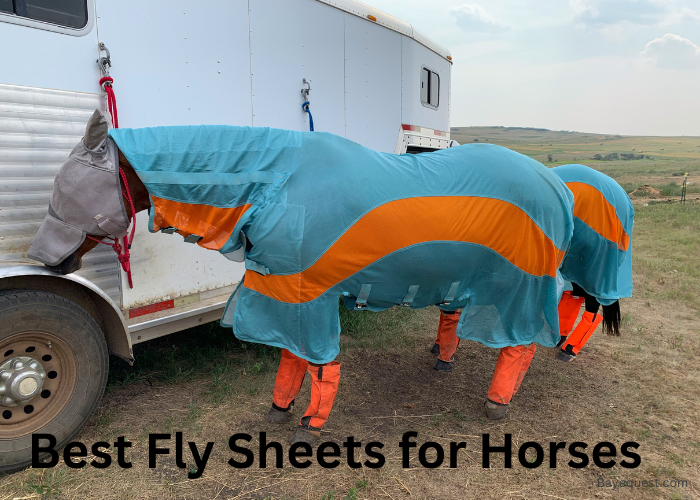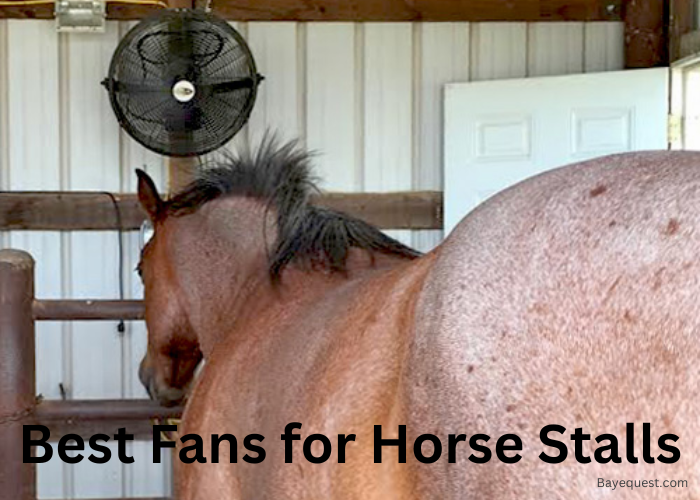Embarking on the journey to buy a horse is thrilling. It’s a significant step into a world of joy and responsibility. Think of it as a partnership where the right match can transform your riding dreams into reality.
But where do you begin? This guide will illuminate the essentials—from the cost and care to temperament and training.
We’ll help you navigate the sea of choices to find that perfect equine partner. We want your investment to be sound and your equine friendship to be built to last.
Let’s saddle up and start this exciting adventure together.
What To Look for When Buying a Horse
- Cost of the horse
- Stabling
- Where to purchase a horse
- Temperament and behavior of the horse
- Health and soundness
- Age
- Experience
- Body conformation and size
- Training
- Breed
- Color
First Time Horse Owner Checklist
As a first time horse buyer, you need to put the following factors into consideration:
Cost of the horse
The cost of a horse can vary depending on factors like breed, age, training, and pedigree. Prices range from a few hundred to thousands of dollars.
When budgeting for a horse, consider the purchase price and recurring expenses. These may include feeding, veterinary care, farrier services, and insurance.
Setting a realistic budget will help you determine the type of horse you can afford and prevent financial strain.
Also, find out the most expensive horse breed in the world.
Stabling
Stabling is where your horse will spend much of its time. So, you must ensure the environment is safe, clean, and appropriate for its needs.
Options include boarding at a stable or keeping the horse on your property. Each choice has costs and responsibilities.
Consider the proximity to riding areas, the quality of care provided if boarding, and the facilities’ overall security.
Where to purchase a horse
You can buy a horse from private sellers, breeders, auctions, or rescues. Each source has pros and cons.
Private sellers and breeders can offer detailed histories of the horse. Auctions might provide cheaper options but less background information. Rescues give horses a second chance, often requiring a thorough evaluation to ensure a good match.
Always research and visit multiple sources to compare and find the most reputable option.
Temperament and behavior of the horse
A horse’s temperament should be compatible with your riding skills and handling experience. Look for a calm, cooperative horse if you are a beginner.
Assessing behavior involves observing how the horse interacts with other horses, responds to handling, and behaves during a ride.
A horse with a good temperament makes for a safer and more enjoyable partnership.
Health and soundness
Before purchasing, conduct a thorough veterinary examination to assess the horse’s health and soundness. Check for signs of past injuries, current health issues, and overall fitness.
A sound horse should have healthy hooves, clean legs, good teeth, and show no signs of lameness. Ongoing health considerations include vaccinations, worming, and regular check-ups to maintain its well-being.
Age
The age of the horse can influence its suitability for your purposes.
Young horses may require extensive training but offer the potential of long-term companionship. Older horses might be more experienced and calmer, suitable for beginners. However, they may also face more health issues and have a shorter active lifespan.
Consider your long-term goals and how a horse’s age aligns with those plans.
Experience
Consider both your experience and the horse’s training level.
A novice rider might be best paired with an experienced, well-trained horse. More experienced equestrians may handle a young or less trained horse.
Evaluate the horse’s history regarding training disciplines, competition experience, and previous ownership to ensure it meets your riding expectations.
Body conformation and size
A horse’s conformation—its physical structure and proportions—impacts its performance and susceptibility to certain health issues. Look for a balanced, symmetrical body that suggests strength and endurance.
Size is also crucial. Ensure the horse is appropriately sized for your height and weight to make handling and riding comfortable and safe.
Training
The level of training a horse has received can affect your experience as a horse owner. A well-trained horse responds predictably to commands and is easier to manage.
Inquire about the horse’s training and consider whether it aligns with your riding style and goals. If necessary, invest in further training to suit your specific needs.
Breed
Different breeds have different characteristics and are suited to various horse riding techniques and disciplines.
For example, Thoroughbreds are known for speed and endurance, while Quarter Horses are preferred for Western disciplines.
Research breeds to find one that aligns with your riding goals and lifestyle.
Read also: Least Suitable Horse Breeds for Novice Riders.
Color
While color should not be a primary criterion, it is a personal preference. Some horse enthusiasts favor certain colors or patterns, which can influence a horse’s value in specific markets.
However, to ensure a fulfilling horse ownership experience, prioritize health, temperament, and suitability for your needs over color.
Related read: Brown Equine Breeds.
Things You Should Do Before Buying Your First Horse
Before buying your horse, check on the following:
Assess your riding ability
It’s crucial to know your skill level before you get a horse. Are you a beginner, intermediate, or experienced rider?
This understanding helps you choose a horse that matches your experience. A beginner might need a calm, well-trained horse, while an experienced rider could handle a horse with more spirit.
Consider taking lessons or asking a trainer for an assessment to accurately determine your level.
Get tack and riding equipment
Tack refers to the essential equipment needed for riding, like saddles, bridles, halters, and reins. Each piece should fit you and your horse properly to ensure safety and comfort.
Start with the basics and choose quality over quantity. You might also want to consult with a more experienced rider or a professional to help you select the right equipment.
Purchase grooming supplies
Grooming is not just about keeping your horse looking good—it’s vital for their health. You’ll need a few basic grooming tools: a brush, hoof pick, mane comb, and body sponge.
Regular grooming allows you to check for injuries and bond with your horse. It also keeps the horse’s coat healthy and can prevent issues like skin infections or hoof problems.
Get health and first aid supplies
A basic first aid kit is essential for minor injuries or emergencies. Your kit should include items like antiseptic, bandages, wound ointment, and a thermometer.
Also, learn some basic first aid techniques, such as how to treat minor wounds or recognize signs of common health issues. A good relationship with a local veterinarian is also crucial.
Get riding clothes
Proper riding attire is important for safety and comfort. This includes a well-fitting helmet, riding boots, and comfortable, flexible clothing that allows for movement.
Make sure your helmet is certified for riding. It can protect you from serious injury in case of a fall. Riding boots should have a small heel to prevent your foot from slipping through the stirrup.
Buy feeding and watering equipment
Your horse needs access to fresh water and a proper diet. Essential feeding and watering supplies include water troughs or buckets and feed bins.
Learn about your horse’s dietary needs, which can vary based on age, health, and activity level. Proper nutrition is crucial for maintaining your horse’s health and well-being.
Related read: Everything You Need to Know About Buying a Horse.
How to Buy a Horse
Buying a horse is a significant decision that requires careful planning and consideration. Here’s a step-by-step guide on how to buy a horse:
Do your research
Start by gathering as much information as you can about horse ownership. Learn about different breeds and what type of horse would be suitable for your riding goals and lifestyle.
Read books, join forums, and talk to experienced horse owners and professionals. Learning about horse care, common health issues, and training methods is also crucial.
Determine your needs
Consider what you’re looking for in a horse. Are you interested in a discipline like dressage, jumping, or trail riding?
Your skill level, the time you can commit to caring for and training the horse, and your physical size compared to the horse are also important factors to consider.
Set a budget
Decide how much you can afford to spend on the purchase price and ongoing costs such as stabling, feed, veterinary care, and insurance.
Have a realistic budget to avoid financial strain later.
Find reputable sellers
Look for reputable breeders, horse trainers, or specialized equine facilities with good reputations. Recommendations from fellow equestrians, trainers, or veterinarians can be invaluable in finding a trustworthy source.
Contact sellers
Once you find potential sellers, contact them to ask more about their available horses.
Before you visit, this is a good time to ask preliminary questions about the horse’s history, health, and behavior.
Arrange a visit
Plan a visit to see the horse in person. This will allow you to observe the horse’s condition, demeanor, and interactions with humans and other horses.
Try the horse
If possible, ride the horse during your visit to assess whether its temperament and training level match you. This is also the time to see how well you connect with the horse.
Conduct a vet check
Before finalizing any purchase, have the horse examined by a veterinarian. This pre-purchase exam can help identify any health issues or concerns that could affect your decision.
Review documents
Ask for all relevant documents, such as registration, pedigree, vaccination records, and other medical history. This will help confirm the horse’s identity and health status and ensure there are no legal issues.
Plan for transport
If the horse is far from your home, you’ll need to arrange for safe transportation. Look into reputable equine transport services and ensure they use appropriate trailers.
Prepare the facility
Before the horse arrives, ensure that your stabling and pasture are ready and safe, with adequate fencing, shelter, and a clean, comfortable environment.
Establish a care routine
Set up a daily routine for feeding, grooming, and exercise based on the horse’s needs. Establishing a routine right from the start will help your new horse settle in and thrive.
Interesting read: Average price of leasing a horse.
Questions to Ask When Buying a Horse
Here are some questions you must ask before buying a horse:
Is he a match for your riding ability?
You need a horse that matches your current skills. If you’re a beginner, you’ll want a calm, experienced horse who is forgiving of mistakes.
More advanced riders might look for a horse with specific training for competitive riding.
Will he suit your riding goals?
Think about what you want to do with your horse. A horse comfortable in various terrains might be best if you dream of trail riding.
Look for a horse trained in jumping or dressage. Matching your horse to your goals ensures you both enjoy your time together.
Do his energy needs match your riding schedule?
Consider how much time you can spend riding and exercising the horse. Some horses need lots of exercise to stay healthy and happy, while others are more laid-back.
Ensure the horse’s energy level fits how often you can actively work with him.
Is his behavior consistent?
A horse with consistent behavior is more predictable, making it easier for you to build a trusting relationship. Observe the horse several times, if possible, to see if he behaves the same way each day, both in and out of the stable.
Will he lope quietly?
Asking if the horse will lope quietly helps you understand if he’s calm and manageable during rides. This is important for safety and enjoyment, especially if you prefer a smooth, steady riding experience.
Will he pass a vet check?
Always have a veterinarian examine the horse before you buy. This check will look for health issues that could affect the horse’s well-being or your ability to ride him.
A clean bill of health means fewer surprises and potential expenses down the road.
Where to Buy a Horse
Deciding where to buy a horse is a crucial step in the purchasing process. It can greatly influence the quality and suitability of the horse you end up with.
Here are some common places to consider when looking to buy a horse:
Private sellers
Buying from private sellers can be a great option. You often get the chance to learn about the horse’s history and current condition directly from the owner.
Private sellers may offer well-cared-for horses with well-documented backgrounds. Always visit the horse in its current environment and observe its interaction with its owner.
Professional breeders
Professional breeders specialize in raising specific breeds of horses. They focus on qualities such as temperament, physical attributes, and abilities.
Purchasing from reputable breeders ensures you get a horse that has been professionally handled and cared for from birth.
Breeders can provide extensive pedigree information and are usually invested in the future of the horses they sell.
Horse farms or training facilities
These facilities often have a variety of horses available for sale. From those trained for specific sports or activities to those suitable for general riding.
Buying from a farm or facility allows you to see multiple horses at one time, making comparisons easier. These places often offer a trial period where you can ride and interact with the horse before making a decision.
Auctions
Auctions can be a place to find horses at lower prices, but they come with higher risks. Getting detailed information about a horse’s history, health, and temperament in an auction setting can be difficult.
If you choose to buy at an auction, it’s wise to go with someone experienced who can help you make informed decisions.
Rescue organizations
Rescue horses can be a rewarding option, as you provide a home to a needy horse. These organizations usually evaluate the health and temperament of horses before putting them up for adoption.
However, rescue horses’ backgrounds can be varied and not always well-documented. Support from a rescue organization often continues after adoption.
Online listings and classified ads
The internet has made finding horses for sale across a wide area easier. Websites dedicated to horse sales allow you to search by breed, location, and price.
However, be cautious and ensure you visit and vet the horse in person before making any decisions.
Conclusion
Embarking on the journey to buy your first horse is both exhilarating and daunting. It’s a path paved with decisions that shape your equestrian experience and the bond you’ll forge with your new companion.
Remember, the right horse isn’t just about pedigree or price. It’s about connection, compatibility, and mutual respect. Take your time, trust your instincts, and lean on the wisdom of those who’ve walked this path before you.
As you step into this new adventure, let your heart lead the way to finding a horse and a true partner for the ride.








